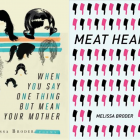Writing Is Like Going Back to School
So, if you don’t believe writing is like vacation, perhaps I can convince you it’s like going back to school? Whether we’re still in school or not, there’s a refocusing that comes each September, a back-to-real-life feeling that arrives with the yellow buses and cool Canadian air. We stop scanning the horizon for boats or mountain peaks or clouds, and look down at the work in front of us. We lose the dreamy distance of vacation and refocus on the necessities of the every day.
And this is like writing, how? If you think of vacation as the dreamy phase, when you’re brimming with ideas and feeling excitement expand in your chest from all the possibilities, think of back to school as revision; it’s time to turn on your critical eye and start shaping all those possibles into a particular.
How can thinking of writing as going back to school help you (and not depress you)?
Here are a few ideas.
The bus comes every day.
We live on a quiet street and my daughter has recently become obsessed with the school bus, one of the few loud noises that arrive each day. She talked about it all summer. (“Bus coming?” she would ask, hoping I’d reply with something other than the familiar and indeterminate, “Soon.”) Finally, the bus has returned. It comes every day at 8:20 and 3:55.
So too, writing should come every day. This advice is not news to any of you; most writers advocate for it, as a way to make progress and as a hedge against writers block. (How can you be blocked if you’re always writing?) But that doesn’t make it any easier to slot it into your schedule. And back to school is back to real life. As in: who’s walking the dog, what’s for dinner, where’s my blue tie? All those loose and easy summer days that seemed to go on forever are gone. The days grow short, but ever more full.
So: be the bus. Pick a time every day and write, for as long as you can, even if it doesn’t feel like it’s long enough. It will become more than you think.
Be prepared.
When I was in grade school, we could only use pencils (pens came in junior high) and covered our textbooks in paper bags. We took great care at the start of the year to wrap and decorate our books for the year, to sharpen our pencils and zip them into the purple and green pouch we’d taken over a half hour to decide on in Caldor.
Today students use whiteboard markers and iPads. Maybe there are still pencils too; I’m not sure. Either way the idea of preparation is the same. There are rituals of preparation we can undertake to prepare ourselves to write. One that I often use involves no school supplies whatsoever. Before going to sleep, I try puzzling out a problem in my story. As I lie there feeling guilty I haven’t written more, and get ready to slide out of consciousness, I often come up with solutions that wouldn’t have occurred to me otherwise. I write down my insight and drift off feeling a bit more satisfied with my writing output for the day.
Don’t forget your ABCs.
In school you learn the easy stuff before the hard stuff. It’s only logical. But in writing, you can know the basics, be up to your ears in the hard stuff, and still need a refresher with every new story or novel that you begin.
Last year, I discovered a bunch of my old stories and was pleased to find that they were better than I remembered, the characters rounder, the plots more satisfying. (My old bugaboo: the fantastically realized plotless story. Ugh.) They reminded me that I have known how to write a good story for a long time.
Then why is it so hard? Because you can forget the basics. We need to drill like pianists or tennis players. Which sounds about as fun as the times tables, but actually can work. I teach a new class of beginning fiction to undergraduates each fall and am always surprised by the way the basics I drill into them come back to benefit me in my ongoing work. Even the hard stuff.





